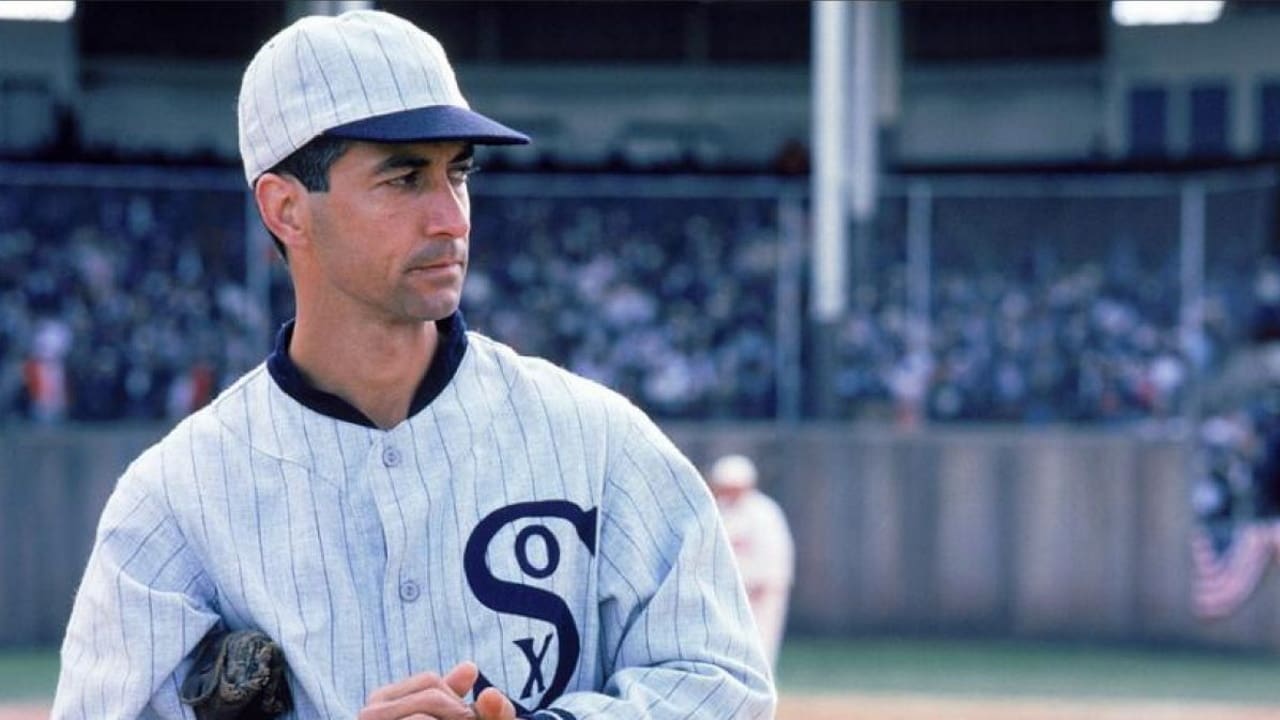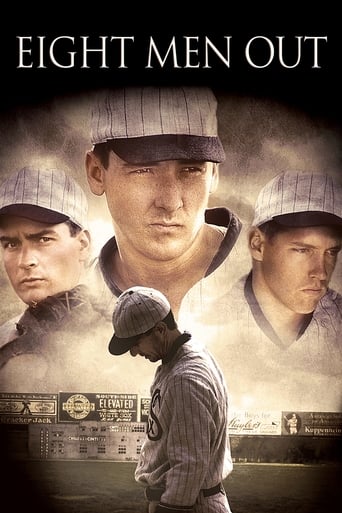romanorum1
One hundred years ago as of this writing, the Chicago White Sox won Major League Baseball's World Series. Two years later, in 1919, they did not repeat as some players planned to lose. Charles "Commie" Comiskey (Clifton James), owner of the Chicago White Sox, addresses a group of sports writers/press agents, including Ring Lardner (John Sayles) and Hugh Fullerton (Studs Terkel). Comiskey, cocksure, says that his team, led by Kid Gleason (John Mahoney), is so good that the 1919 World Series with the Cincinnati Redlegs won't go the nine-game limit. Actually that was the prevailing view then, and the gambling odds were 3-1. But below the surface his team is disgruntled: the players are vastly underpaid, except for Eddie Collins (Bill Irwin), a college graduate who knew how to negotiate contracts. The players did not even get their promised bonuses. And 35-year old Ed "Knuckleball" Cicotte (David Strathairn) had the greatest grievance of them all. Skinflint Comiskey had promised him a $10,000 bonus if he won 30 games. Cicotte won "only" 29, because the owner told Gleason to "rest" him for two weeks. The players are easy prey for the gamblers, who are watching the pennant-clinching game against the St. Louis Browns. These gamblers include Bill Burns (Christopher Lloyd) and Philly Maharg (Richard Edson), who are sizing up their potential lackeys: "Chick" Gandil (Michael Rooker), "Swede" Risberg (Don Harvey), "Shoeless" Joe Jackson (D. B. Sweeney), "Hap" Felsch (Charlie Sheen), "Lefty" Williams (James Read), and others. After the first few minutes, the movie concentrates on the gamblers. Abe Atell (Michael Mantell), a crooked former featherweight champ of the world, is approached by Burns and Maharg. Atell apparently lies when he says that he will fix the series with Rothstein's approval. Rothstein balks when first approached – not by Burns/Maharg – but by Boston's Joseph "Sport" Sullivan (Kevin Tighe), another crooked gambler. Later Rothstein supposedly gives the nod to Sullivan and gives him the first payment of $40,000 for the players, but Sullivan uses most of it to bet on the Reds; so does Atell. Because of the heavy betting on the Reds, the odds ominously drop to even-up. Suspicions are everywhere. Ring Lardner and Hugh Fullerton agree to mark their scorecards with circles when they spot a suspicious play, and to compare them afterwards. After forty-five minutes, the World Series begins in Cincinnati. In game one, Cicotte hits the first batter in the bottom of the first inning, the signal that the fix is on for real. Cicotte is shelled in the fourth as the Reds win 9-1. Ring Lardner (John Sayles) visits Cicotte after the game and wants to know if things are legitimate; Cicotte says yes. In game two, "Lefty" Williams, also in on the fix, loses a more respectable 4-2 decision. He refuses catcher Ray Shalk's (Gordon Clapp) entreaties to throw his curve ball. Comiskey, furious that his team is losing, complains to Ban Johnson (Clyde Bassett) to no avail. Atell welches on most of the bet money owed to Burns and Maharg for the players. White Sox rookie, Dickie Kerr (Jace Alexander), not in on the fix, pitches brilliantly in game three as the Sox win 3-0. Atell blows his cash by betting on Cincinnati. So do Burns and Maharg. In game four, Cicotte pitches well enough and doesn't yield an earned run. But he deliberately misplays an easy grounder, and then intentionally interferes with Jackson's terrific relay that would have cut down a runner at home plate. Reds win 2-0. In the next game, Williams is shelled and loses again. Then in Cincinnati, Cicotte defeats the Reds. Then Kerr again courageously wins again, as Gandil drives in the winning run in the tenth!Now with the series returning to Chicago, gamblers get anxious even though Cincy still leads in games, 4-3. Williams, scheduled to pitch, is told by a gambler, sent by Sullivan, that his wife would be shot if he wins. In real life, his own life was threatened, not hers. So in game eight, Williams amazingly loses for the third time (10-5), and the Reds win the series. But in the end the players get very little of the gambling money. And Atell earns a broken nose (for crossing Rothstein?). With rumors and suspicions flying about, and with exposés by Lardner and Fullerton, the owners decide to hire eccentric Judge Kenesaw Mountain Landis (John Anderson) as baseball's first commissioner. A grand jury is then formed. Before the trial, a tearful youth supposedly asks Jackson the famous quote, "Say it ain't so Joe." At the trial the players win acquittal (!). But ironically, and regardless of the favorable verdict, Landis expels the "Black Sox" from the game for life. Major League Baseball was a private monopoly after all. It would take the White Sox forty years to win another pennant, but they again lost the series. Not until 2005 would they finally win it all, the first since 1917! The movie is based on Eliot Asinof's excellent book of the same name. Despite the dramatic liberties and plot simplifications for the audience's sake, the film is factual. It is a fine period piece, with the uniforms and authentic-looking stadiums and their ominous concrete outfield walls. It is best understood by baseball aficionados. Of the crooked players, David Strathairn (Ed Cicotte), John Cusack ("Buck" Weaver), and D. B. Sweeney (Joe Jackson) are the most sympathetic. Cicotte, mistreated by Comiskey, wrestled with his moral dilemma. Weaver did not participate, but failed to report the plot. Jackson played very well, batted .375, and belted the only homer of the series! Ringleaders Gandil (Rooker) and Risberg (Harvey), along with the gamblers, are the real villains. Writer-director John Sayles as Ring Lardner is sufficiently impassive. Historically, note that the fix was not confirmed until the closing days of the 1920 season, when the Chisox were battling for a repeat pennant. The trial occurred in 1921.
Red-125
Eight Men Out (1988) was written and directed by John Sayles. The movie is a dramatization of the events before, during, and after the 1919 World Series. I found this movie both fascinating and moving.Director Sayles--who also plays journalist Ring Lardner--has formulated the film as a labor vs. management struggle. Sayles portrays club owner Charles Comiskey as a miserly, selfish, dictatorial boss. His team was the finest in baseball, yet he underpaid them, broke promises to them, and got rich while they remained poor. From this perspective, most of the players were easy targets for gamblers, who arranged for them throw the series and collect the cash offered to them.The acting was excellent, especially by John Cusack, who played George 'Buck' Weaver. Weaver maintained that he was innocent until the day he died, and Cusack made that position believable. Also excellent was Hugh Fullerton who played journalist Studs Terkel.If you love baseball, this is a can't-miss movie. If you don't love baseball, I still recommend it. That's because it's very dramatic, and it really is a labor film as much as it's a baseball film. We saw the movie in the wonderful Dryden Theatre in George Eastman House, in Rochester, NY. It was part of the excellent Rochester Labor Film Series.It was a treat to see an original print of the film projected on the large screen at the Dryden. I think some of the drama of the baseball games will be lost on the small screen, but the film will work well anyway. Find it and see it!

